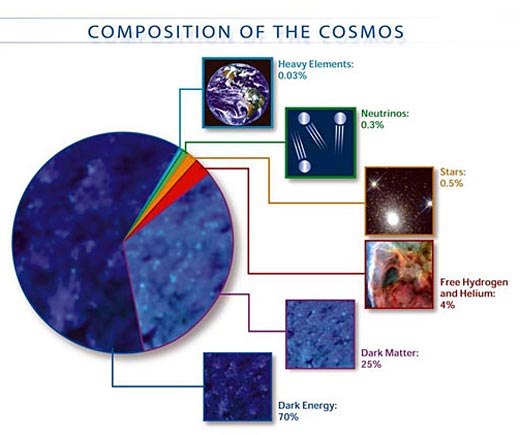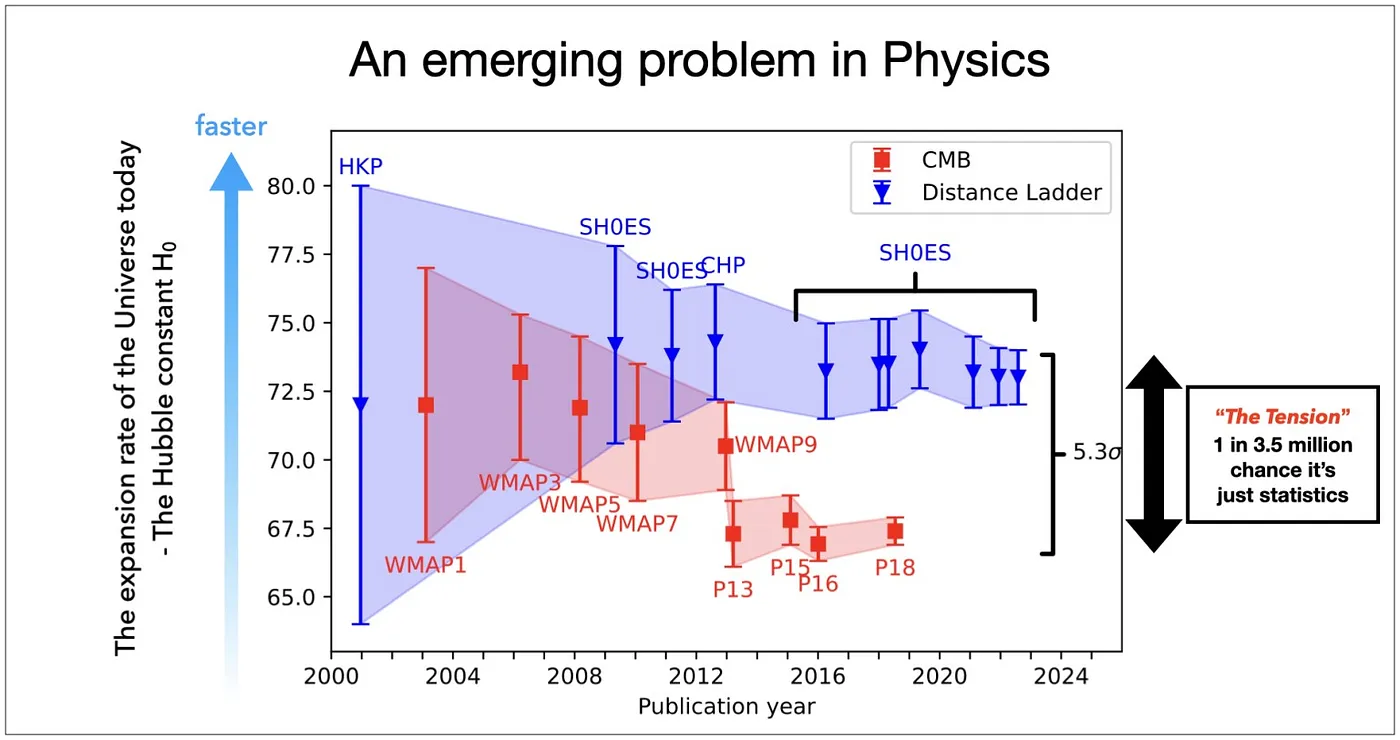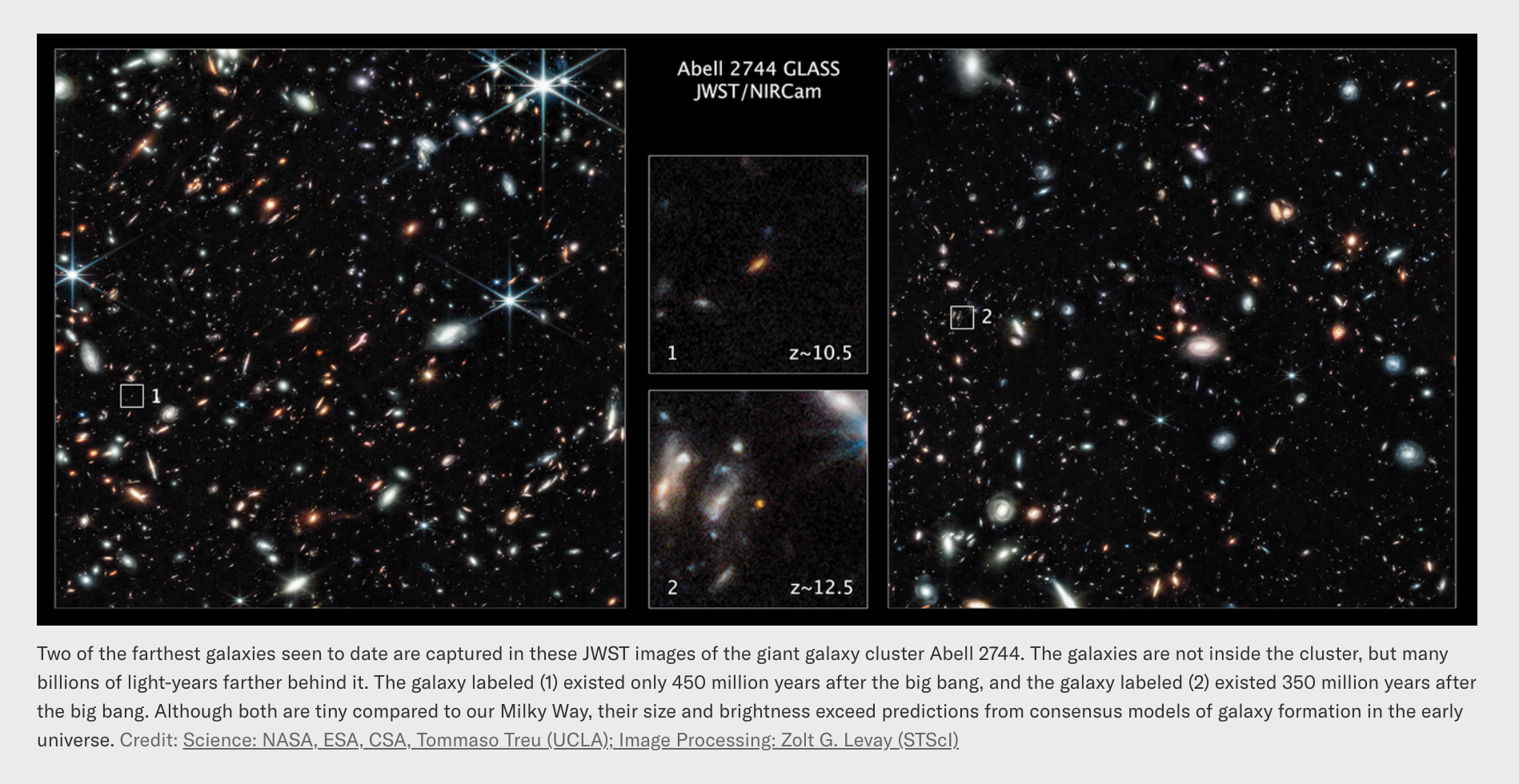
|
Astronomy 123: Cosmology and Our Place in the Universe |

|

|
Astronomy 123: Cosmology and Our Place in the Universe |

|
Current Events:
Sky and Telescope News
Astronomy
Science Daily
National Geographic
APOD
The specific goals of Cosmology are to (1) gain an understanding of basic science that underlies Astronomy (the forum is modern cosmology), (2) determine the properties of and the constituents of our Universe, and how our knowledge follows from empirical data, and (3) formulate a coherent model for the interpretation of the observational evidence, currently, the hot Big Bang model. (4) Finally, we present fairly recent results that have derived from the new field of Astrobiology to discuss and consider our place in the Universe.
Other courses in the Astronomy group:
Astr 121: The Solar System
Astr 122: The Birth and Death of Stars
|
 |

Over the last ten years or so an issue has been brewing: the rate of expansion of the Universe based on two independent lines of evidence have found different answers. One is based on observations of the Cosmic Microwave Background (CMB) and the other based on observations of Type Ia supernovas in distant galaxies calibrated using Cepheid variables in nearby galaxies. The different rates can't both be right as there must be only one expansion rate for the Universe. This problem is referred to as the Hubble Tension or simply Tension. Related Sky and Telescope story |
 Related Sky and Telescope story |
Scoring:
Total Course Points: 3 x 40 pts + 4 x 10 pts = 160 pts
Tentative Grading Scale:*
Tests:
The course is divided into 4 parts. Each test covers material primarily taken from one section of the course. The last test, Test 4, will not be cumulative. The test format will be rioughly 50 % multiple choice questions and 50 % short answer questions.
Homework/In Class Assignments:
Late assignments will be accepted after the assignment's posted due date. Late assignments lose 1 point for each day late.
Academic Deadlines:
Last day to adjust registration without recorded W |
April 6, 2024 |
Last day to register/add classes online | April 8, 2024 |
Last day to apply for Spring 2024 undergraduate degrees in DuckWeb | April 28, 2024 |
Last day to withdraw from classes | May 19, 2024 |
Last day for grade option changes | May 19, 2024 |
Memorial Day Holiday | May 27, 2024 |
Last day of Dead Week |
June 7, 2024 |
Ref: link for complete set and descriptions of academic deadlines for spring 2024: Spring Academic Deadlines
Week |
|
|
1,2,3 |
Introduction-- Cosmic Perspective Chapter 1: A Modern View of the Universe; Scientific Method (Ch 3.4), Chapter 22: The Birth of the Universe, Observations: Hubble's Law (Ch 20.2, 625-627), CMBR (Ch 22.2), Chemical Make-up of Universe (Ch. 22.2), Structure of Universe, Structure in the Universe, Cosmological Principle (Horizon and Flatness), Chapter 19: Our Galaxy, Star Counts: Herschel and Kapteyn, Shapley (Ch. 19.1), Perfect Cosmological Principle, Anthropic Principle |
Topic 1 |
3,4 |
World Views of the Universe-- Chapter 20: Galaxies and the Foundations of Modern Cosmology; Universe on large scales, expanding universe, fate of the cosmos, geometry of space, will the Universe expand forever? |
Topic 2 |
4,5 |
History of the Universe-- Chapter 22: Birth of the Universe; Back to the Big Bang, Evolution of the Universe, the Inflationary Universe, Formation of Nuclei and Atoms, Structure in the Universe and the CMB |
Topic 3 |
6,7,8 |
Observations: Fate of the Universe-- Chapter 23: Dark Matter, Dark Energy, and the Fate of the Universe; Will the Universe Expand Forever? |
Topic 4 |
8 |
The Drake Equation-- Chapter 24: Life in the Universe, The Drake Equation: Exoplanets (Chapter 13 Exoplanets: The New Science of Distant Worlds) |
Topic 5 |
9 |
The Drake Equation: Astronomy Terms-- Exoplanets and Life in the Universe |
Topic 5a |
10 |
The Drake Equation: Astronomy/Biology, and Social Science Term-- Exoplanets and Life in the Universe |
Topic 5b |
10 |
Fermi Paradox, SETI, and Interstellar Travel-- Life in the Universe |
Topic 6 |
Time and Its Beginning-- Chapter 4 Making Sense of the Universe: Understanding Motion, Energy, and Gravity |
Topic 7 |
Students who are ill or have symptoms
should be held harmless in attendance policies.
Frequent absences and lack of availability for make-ups may jeopardize a
student's chance for success in the course. In the case of frequent absences
or lack of availability for make-ups or in-class exercises, the affected
student must communicate with the instructor as
early as possible.
Instructors will provide make-ups for exams under appropriate circumstances.
In cases where
students are missing only minor yet essential coursework at the end of the
term, a grade of "Incomplete" may be used for make-ups
that will take place
after grades are due
(see Incomplete Policy https://provost.uoregon.edu/grades-incompletes-policy).
Attendance when Ill or Symptomatic
Academic Misconduct
The University Student Conduct Code (available at conduct.uoregon.edu) defines academic misconduct. Students are prohibited from committing or attempting to commit any act that constitutes academic misconduct. By way of example, students should not give or receive (or attempt to give or receive) unauthorized help on assignments or examinations without express permission from the instructor. Students should properly acknowledge and document all sources of information (e.g. quotations, paraphrases, ideas) and use only the sources and resources authorized by the instructor. If there is any question about whether an act constitutes academic misconduct, it is the student's obligation to clarify the question with the instructor before committing or attempting to commit the act. Additional information about a common form of academic misconduct, plagiarism, is available at https://researchguides.uoregon.edu/citing-plagiarism.
Inclement Weather
It is generally expected that class will meet unless the University is officially closed for inclement weather. If it becomes necessary to cancel class while the University remains open, this will be announced on Canvas and by email. Updates on inclement weather and closure are also communicated in other ways described here: https://hr.uoregon.edu/about-hr/campus-notifications/inclement-weather/inclement-weather-immediate-updates
Academic Disruption due to Campus Emergency
In the event of a campus emergency that disrupts academic activities,
course requirements,
deadlines, and grading percentages are subject to change. Information about
changes in this course will be communicated as soon as possible by email,
and on Canvas. If we are not able to meet face-to-face, students should
immediately log onto Canvas and read any announcements and/or access
alternative assignments. Students are also encouraged to continue the readings
and other assignments as outlined in this syllabus or subsequent syllabi.
In the event that the instructor of this course has to quarantine, this
course may be taught online during that time.
Reporting Obligations
I am a [designated reporter/student-directed employee]. For information about my reporting obligations as an employee, please see Employee Reporting Obligations on the Office of Investigations and Civil Rights Compliance (OICRC) website. Students experiencing any form of prohibited discrimination or harassment, including sex or gender-based violence, may seek information and resources at safe.uoregon.edu, respect.uoregon.edu, or investigations.uoregon.edu or contact the non-confidential Title IX office/Office of Civil Rights Compliance (541-346-3123), or Dean of Students offices (541-346-3216), or call the 24-7 hotline 541-346-SAFE for help. I am also a mandatory reporter of child abuse. Please find more information at Mandatory Reporting of Child Abuse and Neglect.
Mental Health and Wellness
Life at college can be very complicated. Students often feel overwhelmed or stressed, experience anxiety or depression, struggle with relationships, or just need help navigating challenges in their life. If you're facing such challenges, you don't need to handle them on your own--there's help and support on campus.
University Health Services help students cope with difficult emotions and life stressors. If you need general resources on coping with stress or want to talk with another student who has been in the same place as you, visit the Duck Nest (located in the EMU on the ground floor) and get help from one of the specially trained Peer Wellness Advocates. Find out more at health.uoregon.edu/ducknest.
University Counseling Services (UCS) has a team of dedicated staff members to support you with your concerns, many of whom can provide identity-based support. All clinical services are free and confidential. Find out more at counseling.uoregon.edu or by calling 541-346-3227 (anytime UCS is closed, the After-Hours Support and Crisis Line is available by calling this same number.
Basic Needs
This UO webpage includes resources for food, housing, healthcare, childcare, transportation, technology, finances, and legal support: https://blogs.uoregon.edu/basicneeds/food/
Accommodation for Religious Observances
Accommodation for University-Sponsored Events
University-sponsored events are considered verifiable, legitimate reasons for participating students to miss class. When students miss class for university-sponsored activities, faculty are stronly encouraged to make pedagogically sound and justifiable modifications that will enable the students to be successful in the course where possible. However this request has limits and conditions.
Students who participate in university-sponsored activities that might cause them to miss class are responsible for providing documentation signed by a university employee verifying their participation in the activity and listing the dates that they might miss class. This should be done during week one of the term.